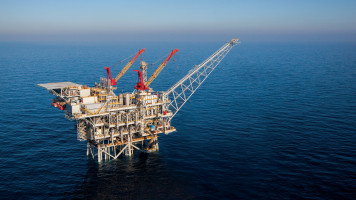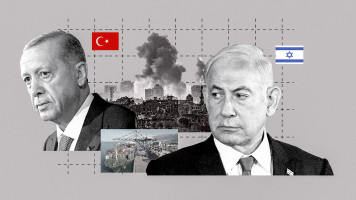
Is freedom of expression in Lebanon under threat?

Freedom of expression and the press are under threat in Lebanon, something that some TV stations and journalists have learned the hard way in recent months.
Al-Jadeed TV station faced three attacks between December and January after airing a comedy sketch that some viewers deemed offensive to the Shia community in the south of Lebanon.
In the sketch, Joanna Karaki, a Lebanese comedian wearing a black hijab and mimicking a southern Lebanese accent, said that "the majority of children in the South have green or blue eyes and are blond", implying relationships between local women and UN peacekeepers.
The sketch was aired shortly after the death of Irish UNIFIL soldier Sean Rooney, who was shot in the head while on duty in southern Lebanon.
"Although Lebanon has some civil liberties and a diverse media landscape, it is also plagued by widespread corruption and deficiencies in the rule of law"
In late January, LBCI TV station in Beirut was attacked with a suspected explosive device. LBCI broadcast footage of the attack while it was happening live on air. The explosive was thrown into the parking lot and damaged one vehicle, but no injuries were reported.
The TV station reported that the main suspects were two individuals seen on CCTV footage riding a motorbike. While the reason for the attack has not yet been determined, the station had also recently aired a comedy show that joked about Lebanon's Shia population.
These recent attacks are not isolated cases but are indicative of how freedom of expression and freedom of the press continue to be under threat in Lebanon.
Although Lebanon has some civil liberties and a diverse media landscape, it is also plagued by widespread corruption and deficiencies in the rule of law.
Furthermore, the sectarian-based political system in the country increases the potential violations of civil liberties to silence critics or hide wrongdoing spotlighted by the media.
Freedom House, a US non-profit organisation funded by the government, has ranked Lebanon as "partially free", placing it 42nd out of 100 countries in terms of political rights and civil liberties.
Human Rights Watch's Middle East and North Africa director Lama Fakih told The New Arab that such attacks are part of a broader problem reflecting the failure to protect freedom of expression in the country.
"The legislative environment in Lebanon is not supportive of freedom of speech or freedom of the press. We continue to see that criminal defamation and libel laws are being used to stamp out legitimate dissent, including by the press. At the same time, a number of our laws need to be updated, and we need to see advancements on a draft media law that is protective of freedom of expression and freedom of the press," she said.
|
|
One of the issues threatening the freedom of expression and the press in Lebanon is the inadequate response by the state.
If the government fails to effectively investigate and hold those responsible accountable for attacks on free expression, it may indirectly encourage further attacks. Past attacks on the press have not been thoroughly investigated, and the individuals responsible have not faced consequences for their unlawful actions.
Incidents targeting freedom of expression and the press in Lebanon are numerous and also include serious acts such as assassinations.
One of the most recent cases was the murder of Lokman Slim, a Lebanese publisher, political activist, and long-time critic of the Shia political group Hezbollah, who was found shot dead in February 2021. Many people, including Slim's sister, have alleged that Hezbollah committed the assassination, a charge that the group has denied.
"The economic crisis and political instability have catalysed the deterioration of freedom of expression and the press in the country"
In this context, the economic crisis and political instability have catalysed the deterioration of freedom of expression and the press in the country.
A report by the Samir Kassir Foundation found 117 violations of freedom of speech and the press in Lebanon in 2021, noting that the government has become more intolerant of criticism.
Furthermore, security, judicial, and labour organisations have resorted to using repressive measures against those who express dissenting opinions through cultural or artistic means, according to the report.
Fakih explained that a political vacuum and the economic crisis had negatively impacted such freedoms. The ability of security forces to respond to incidents has also been restricted, and lawlessness is growing in the country.
Journalists in Lebanon continue to face intimidation and arrests. The recent attacks on media outlets recall a darker period in the country's history when journalists and media outlets were targeted with deadly violence. This was especially prominent in 2005, when two journalists, Samir Kassir and Gebran Tueini, were killed by car bombs and another journalist, May Chidiac, was targeted in an attempt on her life.
The Press Freedom Index by Reporters Without Borders ranks Lebanon 130th out of 180 countries in 2022, a significant drop from its 2018 ranking of 100th prior to the beginning of the economic crisis in October 2019.
The recent attack on the LBCI TV station was condemned by the caretaker Prime Minister Najib Mikati, who said that media freedom must be protected and promised to intensify the investigation into the incident.
However, the majority of the investigations into such attacks have yielded nothing, leaving perpetrators to go unpunished.
"Current legislation that should protect freedom of expression and the press is not implemented consistently, but rather is used as a tool to allow the political elite to retain power and use it against its opposition"
Furthermore, it's the government itself that often undermines freedom of expression. For instance, the Lebanese LGBTQ+ community has recently experienced several governmental restrictions on organising events and faced intimidation from sectarian organisations. Governmental censorship has also targeted films and plays over the years.
Fakih explained that the current legislation that should protect freedom of expression and the press is not implemented consistently, but rather is used as a tool to allow the political elite to retain power and use it against its opposition.
"We cannot live in a country with impunity for all crimes. The inability to prosecute officials responsible for the Beirut explosion, and the lack of faith in institutions to do so, send the message to citizens that there is no rule of law. This is damaging as it undermines trust in institutions, and security, and emboldens people to act unlawfully without consequences," she said.
Dario Sabaghi is a freelance journalist interested in human rights.
Follow him on Twitter: @DarioSabaghi
![The front pages of international Arabic newspaper Asharq Al-Awsat and Lebanese newspaper al-Akhbar at a newspaper stand in Lebanon's capital Beirut, on November 8, 2020. [Getty]](/sites/default/files/styles/medium_16_9/public/1229522670.jpeg?h=ee3ec4ae&itok=FsKgUWFc)


